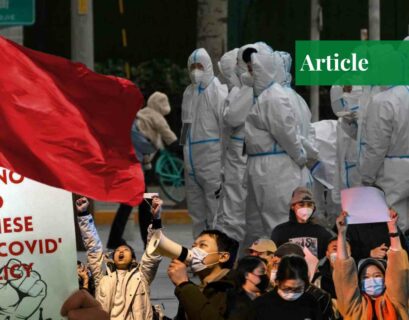Ms Umme Ammara is an undergraduate student of BS-Economics with Data Science at Information Technology University. She has presented papers at international and national conferences. Her research interests include system thinking, public policy, and, ethics and technology. She is determined to inform public policy using data-driven and philosophical approaches.
Black Swan or White Swan
COVID-19 is not a black swan event. The prospective prediction of a pandemic makes the event a white swan rather than a black swan event, according to Taleb (2020), a risk analyst whose main areas of research are probability, risk and uncertainty. Similarly, health experts also predicted that a contagion pandemic would emerge, as reported by Harvard Business Review (Dhillion et al., 2017).
However, COVID-19 has met the one characteristic feature of a black swan event; it has created catastrophic impacts worldwide, but based on one feature it cannot be inferred that it is a black swan event. The responsibility falls on the governments and health and policy experts.
Despite the virus prediction, why would our system not prevent this disaster? What gaps can Pakistan fill in its system to combat future crises? It had all started with the lockdown measures in China due to surging COVID-19 cases, with global supply chains starting to disrupt. From South Korean car manufacturers to American toy manufacturers, all multinationals were forced to a standstill.
Their dependency on China for spare parts to manufacture their products left them with no other option but to halt their production (Richburg, 2020). Covid-19 has had many pervasive consequences on economics, social and political activities on a global scale. Hence, countries were compelled to lock-down life. Pakistan’s economy, which is highly dependent on international trade and remittances, had also been affected by the negative externalities of COVID-19 (Ahmed, 2020).
Looking to the SME Sector
Negative externalities have accentuated the gaps in our systems responsible for adverse effects on the most vulnerable people. The global pandemic could create a unique opportunity for rethinking our complex solutions (Asian Development Bank Report, 2020). The government relief packages and measures to address the current pandemic should target Small and Medium Enterprises (SMEs) as the SME sector has the potential to accelerate economic growth, especially in Pakistan.
Moreover, at the time of a pandemic, particular SMEs can come up with innovative solutions to lessen the economic burden. To be a better performer in a crisis, there’s a need for long-term planning in policymaking processes in terms of pondering on the fragile system of our economy rather than relying on the so-called efficient system.
Pakistan must also work towards institutional change with the aim to build a human economy centred on human development which strengthens the economy to curb future emergencies. On the instructions of the federal government, the State Bank of Pakistan introduced reforms in the monetary process almost in a week; it has reduced the interest rate from 13.25 per cent to 11 per cent.
Will it ease investments? To answer this, a 6-8 months time lag between the State Bank of Pakistan’s decision on the interest rate of the central bank and its real sector investment impact is required. Considering the lockdown situation, decreasing domestic demand and shortfalls in raw materials have also declined the profitability of investors which may be the cause of delayed response to the fall in the interest rate policy.
However, unintended consequences can occur as the fall in interest rate has reduced the long-term government bond and raised the short-term portfolio investment. It also may reduce domestic debt servicing and could increase the foreign debt servicing as the funds’ outflows have increased, depreciating the currency. Approximately, 2 billion dollars of hot money has been outflowed.
A fall in interest rate increases the demand for credit and increases output; however, due to lockdown measures economic activity has remained stagnant and the rate of profit is very low, so policy rate reduction will cause unintended consequences in return rather than the observed behaviour of increased investment (Ahmed, 2020).
With this uncertainty in the investment climate, the government should move towards alternative solutions to pace the growth. One of them is to invest in the SME sector of Pakistan which requires lower investment and would generate more employment opportunities. As in the 2008 financial crisis, production was not a major problem, rather the economy was struggling with aggregate demand shortfall (Asma, 2020).
Now, the situation has worsened with the global supply chain disruptions. According to the Center for Disease Control and Prevention, the global surge in the cases of COVID-19 has impacted the supply chains globally (Roser et al., 2020). COVID-19 has exacerbated unemployment, especially among those involved in the informal sector (Asma, 2020).
Goertzel (1994) reported that most people believe in conspiracy theories, particularly young people. He further went on to conclude that belief in conspiracies was correlated with a lack of trust and insecurity. Thus, due to distrust in authorities, the business would likely suffer as consumers’ concerns regarding them are increasing day by day due to the COVID-19 pandemic.
Furthermore, it has also been evident that both who believe in conspiracies and those confronted with conspiracies face adverse effects such as shattering of confidence in authorities (Douglas & Leite, 2017). Consequently, consumer confidence in companies and authorities would be hit, which could, in turn, alter the companies’ supply and demand equilibrium.
Countries are in the dichotomy of saving lives or livelihoods. Despite the complex data-driven solutions to solve the system’s problems, measures to curb the current pandemic are not resolving the issue. It made us shudder at the fragility of our system and rethink our divisive measures of solving the problems of fragile systems with complexity rather than simplicity.
As Taleb (2012) rightly claims, removing stressors or disorders from the system makes the system fragile as it loses its ability to withstand shock, and when exposed to sudden shocks, randomness causes irreversible, large and rare errors to the efficient and optimized system as the system has become sensitive to shock.
Discussion & Analysis
As the COVID-19 outbreak has created uncertainty and upheaval around the globe, the countries have started to look for opportunities to meet the demand for their essential commodities by devising new ways to stabilize their economy. In this respect, countries will be cautious to keep China, the epicentre of COVID-19, their main supplier.
The Australian Strategic Policy Institute believes that ‘make it at home’ will be the new motto (Richburg, 2020). The New York Times reported that France’s finance minister, Bruno Le Maire, directed companies to evaluate their dependency on China’s supply chains, which shows that the government is thinking more about the possibility of domestic production (Irwin, 2020).
Worldwide Measures Initiated for SMEs
To mitigate the economic impacts of the current pandemic, many governments have initiated appropriate measures for the SME sector by passing an ‘emergency supplementary budget for 2020’. To cover the cost of inactivity, the German government has introduced loans with a three-month maturity period for small, independent and self-employed businesses who have lost bank credit access and separate particular funds for large companies.
Based on short-term refinancing, accelerated payment, tax credit and guarantees over cash flow costs, the French government has introduced liquidity plans for start-ups to mitigate the pervasive pandemic effects (Javed, 2020). Furthermore, to stabilize the economy Alibaba and JD.com, China’s topmost e-commerce companies listed in the Global Fortune 500, have adopted talent-sharing plans and hired short-term staff from those sectors which are under extreme distress (World Economic Forum, 2020).
In Europe, the tourism industry per month incurred €1 billion in losses, thus affecting SMEs associated with the tourism industry. European Tourism Manifesto Alliance (ETMA) suggested that the government provide accessible short and medium-term loans for liquidity shortage issues. Companies have also shifted to providing virtual services to educational institutes and helping students to continue their studies amid the crisis (Javed, 2020).
As the demand for medical products is high, the healthcare sector can attain maximum gains. Pakistan’s pharmaceutical industry has remained active (Ahmed & Batool, 2017). Hence, workers facing layoffs from other industry sectors can be adjusted in the health or pharmaceutical sector to meet the rising demand for masks.
The pandemic has created opportunities for start-ups related to health, studies, entertainment, biotech, fintech, home-based workouts and gaming. For instance, ‘Instacart’, a San Francisco-based grocery start-up has hired hundreds of workers to provide quality and instant service and to meet the consumers’ increasing demand for online products. This indicates that consumer behaviour may change and they would rely on online shopping after the crisis is over (Javed, 2020).
If the SME sector of Pakistan shifts towards e-commerce, it can increase sales potential. Early pandemics suggest that though such outbreaks affect the global supply chain, they also create opportunities for breeding businesses (CNBC, 2020). Another factor is because of a virus outbreak, it is expected that the common behaviour of people especially children will be changed as indicated by mental health specialists.
A Massachusetts-based child psychologist, Mary Calabrese, said, “traumas like the global coronavirus pandemic can affect children particularly strongly” (Daily Times, 2020). Thus, the SMEs related to toys can come up with fun toys designed for learning and relieving stress to promote stay at home campaigns.
Need for Institutional Change for SMEs
North (1990), as well as Acemoglu and Robinson (2013), are prominent institutional economists who argued that the nature of the institutional structure is the cause of the difference in economic processes across developing and developed countries.
Their research shows that development problems arise when there is limiting access and only the elite coalitions through privileged access can control the economy through rents. In this case, rent is an unearned income that the elite group receives based on the personal relationship in a limited access order.
Thus, when a state fails to have a monopoly, members of the elite coalitions offer incentives to each other for the maintenance of peace thus hampering sustained growth in a society. However, in an open-access, the state promotes open access into different organizational forms with the enforcement of the rule law and not based on personal relations.
Incentives to innovate widen opportunities to create new organizations which threaten the old rent-generating mechanism. New structures emerge and old ones with debilitating success choke off. Robert Lucas Jr also proposed that incentives play a vital role in economic growth.
Institutions govern the peoples’ decisions regarding saving and investment through the rule of law, not through personal relations, which provides incentives for innovation and private investment thus generating economic activity and sustained income growth per capita (Constantine, 2017).
Human Economy to Strengthen SMEs
To unleash the potential of the SME sector and sustain the growth in the long term, Pakistan has to look up towards building a human economy; an economy for people by people. The root of the human economy is Amartya Sen’s idea of going beyond the mainstream notion of human development in terms of income and wealth. Sen (1999) argued ‘development as expanding real freedom and removing the sources of unfreedom’.
Amartya Sen’s concept of development as freedom has its deep roots in the Aristotelian account of the human good which is directly related to the necessity to ‘first ascertain the function of man’ (Nicomachean Ethics I). The “good quality of life” does not link with material goods, as imagined, but as described in the Nicomachean Ethics – the practice of virtues – and in the contemplation (theoria) of divine things, leading to happiness (eudaimonia).
Sen would differ in this particular view of life as he leaves it as a frame to be filled by each member of society himself. However, Sen gained insights from Nicomachean Ethics I, 5, 1096a 5 where Aristotle states: “the life of money-making is one undertaken under compulsion, and wealth is not the good we are seeking; for it is merely useful and for the sake of something else” (1987a: 3).
Hence, we can assume that Sen’s agreement with Aristotle in this regard is with an idea of looking for good, and only perceives a relation between ‘his concept of capabilities and the Aristotelian concept of dynamis with a moral orientation to the good life – a life of virtues – to achieve happiness (eudaimonia)’ (Tchir, 2011).
Ivo Slaus & Garry Jacobs’s (2011) research pointed out that for sustainable growth, all forms of capital i.e., natural, biological, social, technology, financial, cultural and their interconnections must be considered as human consciousness which will be the driving cause of the values of all forms of capital.
In their research, they included ‘human capabilities ranging from the productive, social or organizational, production, mental intellectual resources to cultural and psychological resources’. The different capital forms have their interrelations and have no independent value. To utilize other forms more productively, money is considered as a means; human capital sustainability should be interrelated with the other forms of capital sustainability.
Researchers considered that to achieve sustainability, ‘the development of human capacity, education of human choice and the evolution of human consciousness’ is critical for sustainable development. This notion was further stressed by Friederich Hayek: ‘the importance of the individual and human choice reinforces an important link between human capital and sustainable development’ (Slaus & Jacobs, 2011).
Hussain’s (2010) research proposed that capitalism has stimulated a consciousness prompted by the voracious desire for the accumulation of commodities without regard for future generations and nature. The mainstream view about markets that they are self-regulating and deliver efficient outcomes has been overturned by Stiglitz (2011). His research work proposed that markets “on their own are neither efficient nor stable”.
The financial resources, productive assets and governance decisions favour the privileged and the poor remain discriminated against. They concluded this based on their survey results that market asymmetries ‘deprived poor farmers as much one-third of their income’ (Hussain et al., 2003: 65-67).
Market-based production propositions to increase output shaped the relationship of the individuals with commodities in terms of wanting more commodities as the “qualities which are inherent to human beings are alienated from them and transposed into commodities”. Then, the advertisement industry invites us “to acquire commodities not simply to fulfil our material needs but essentially to repossess ourselves”.
To place the inner development of a person beyond the insatiable desire to acquire commodities has a close relationship with consciousness. The 17th century Shah Hussain, a Sufi poet, mentions that “those who have to accumulate millions that too is mere dust”, which shows a tradition to go beyond the material world and pursue the journey to the inner self (Hussain, 2009). Hence, it is love and compassion for others rather than mere relations to commodities.
Sen rejects the neo-classical idea of rationality which is restricted to self-interested behaviour and ‘self is before society’. A human economy, as illustrated in Bangladesh, the first low-income country to develop the pharmaceutical industry, shows tremendous improvement since its independence in 1971. Despite international opposition, the country reduced its dependence on costly imported drugs.
The Bangladesh government succeeded to provide health opportunities to all citizens by the collaborative effort of state organisations; Non-Government Organisations (NGOs), pharmaceutical firms, village health workers, doctors, and retailers. The state joined hands with all stakeholders instead of initiating a state-led health programme (ADB Report, 2020).
Correspondingly, China was the first developing country that managed to pull out nearly 850 million Chinese from extreme poverty between 1981 and 2015. The key to success is comprehensive national social protection schemes, supported by legislation, for job creation, social insurance, unemployment, pension, medical care and maternity.
In the past decade, Kazakhstan’s monotown, Stepnogorsk, initiated to participate in government schemes; “the Development of Productive Employment and Mass Entrepreneurship Programme” and “the Programme on the Development of Single-Industry Town 2012-2020 played a crucial role in Stepnogorsk’s economic development. Support for SMEs and start-ups increased the city’s self-employment more than the national average (ADB Report, 2020).
Taleb, a proponent of an antifragile system, argued that the government should adopt rigid fiscal conservatism because debt makes the system fragile. He mentioned that the prerequisite of political antifragility is zero debt, and such an antifragile system can withstand shocks.
Conclusion
As SMEs can transform a fragile economy into one that can withstand shocks, the paper proposes that authorities should give importance to strengthening the SME sector of Pakistan. However, without institutional change with an aim to build a human economy, Pakistan can not unleash the SMEs’ potential. Following are the immediate recommendations to strengthen the SMEs sector:
- A policy that provides digital knowledge to the youth of Pakistan and will be centred more on training concerning global freelancing markets;
- There are almost 144 million cellular subscribers in Pakistan out of which 38 million are internet mobile users, hence by using digital marketing and SMS marketing techniques, awareness issues can be solved by advertisements on every possible source;
- The Ministry of Information Technology & Telecommunication to bring Punjab Vocational Training Council, Trade Development Authority of Pakistan, Punjab Skills Development Fund, Small and Medium Enterprises Development Authority, and Punjab Board of Investment and Trade under one specific umbrella where all these can work as a single entity to ensure the flexibility for the execution of the programs;
- Marketing our products in international markets through fairs and events in different countries to promote the potential of the SME sector in Pakistan;
- Establishing an increased market domain through e-commerce;
- Calling for the digitization of payments and not halting Cash on Delivery (COD) services within a decade (or capping it to a maximum of Rs 5000) and using reliable fintech services for the transactions;
- Further recommending mandatory training for people entering the SME sector;
- Urging the synergies between the SME sector and other sectors such as agriculture, transport, and social services;
- Requesting the government to come up with a platform that would connect the entrepreneurs of the country with investors;
- Designing separate facilitation programs targeted at young female-run microenterprises;
- Since it is difficult for small and medium-sized businesses in rural areas to access bank loans, the government should come up with policies that mainly focus on the SMEs in rural areas;
- Requesting the expansion of saving products such as Rotating Savings and Credit Association to meet the needs of those who are unable to access formal financial institutes;
- Calling upon the need to teach, train and guide our youth through proper programs focused on skill development and uplifting human consciousness.
References
- Hussain, A. (2018). Capitalism, consciousness and development. In Economic Theory and Policy amidst Global Discontent (pp. 41-60). Routledge India.
- Slaus, IvoI & Jacobs, Garry. (2011). Human Capital and Sustainability. Sustainability.
- Tchir, T. (2011, March). Aristotelian Practical Reason in Amartya Sen’s Idea of Justice. In Western Political Science Association 2011 Annual Meeting Paper. https://ea of Justice. In Western Political Science Association 2011 Annual Meeting Paper
- Constantine, C. (2017). Economic structures, institutions and economic performance. Journal of Economic Structures, 6(1), 2. https://journalofeconomicstructures.springeropen.com/articles/10.1186/s40008-017-0063-1
- Hussain, A. (2008). Power dynamics, institutional instability and economic growth: The case of Pakistan. Manuscript, The Asian Foundation. http://www.akmalhussain.net/Publish%20Work/Reports/DriversofChange_TAF_April%2008.pdf
- North, D. C., Wallis, J. J., Webb, S. B., & Weingast, B. R. (2007). Limited access orders in the developing world: A new approach to the problems of development. The World Bank.
- Acemoglu, D., & Robinson, J. A. (2012). Why nations fail: The origins of power, prosperity, and poverty. Crown Books.
- Richburg, K. (2020). Covid-19 will permanently alter China’s relations with the world | The Strategist. https://www.aspistrategist.org.au/covid-19-will-permanently-alter-chinas-relations-with-the-world/
- Hyder, A. (2020). SHORT NOTES ON THE ECONOMY DURING THE COVID-19 CRISIS.
- Javed, Asif. (2020). Policy Review Economic Impact of Coronavirus and Revival Measures: Way Forward for Pakistan. https://www.researchgate.net/publication/340477270_Policy_Review_Economic_Impact_of_Coronavirus_and_Revival_Measures_Way_Forward_for_Pakistan
- Taleb, N. (2012). Anti-fragile. Allen Lane.
- Jacob, A., Rankine, H., Weinberger, K., & Aijazi, O. (2020). FAST-TRACKING THE SDGs DRIVING ASIA-PACIFIC TRANSFORMATIONS. Bangkok. https://www.adb.org/sites/default/files/publication/605796/sdgs-driving-asia-pacific-transformations.pdf
If you want to submit your articles, research papers, and book reviews, please check the Submissions page.
The views and opinions expressed in this article/paper are the author’s own and do not necessarily reflect the editorial position of Paradigm Shift.

















